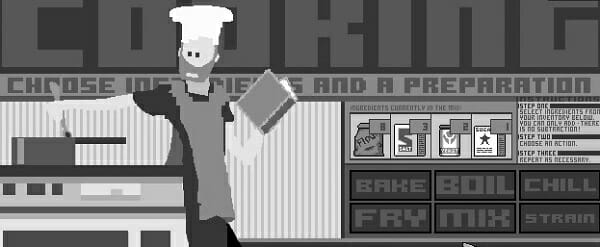Cart Life (PC)

I spent money on things I didn’t need. I accidently slept too late, missing the opportunity to walk my daughter to school. I sold my first cup of coffee for a profit of two cents. I agreed to make drinks for customers without having the necessary ingredients. I gave some customers incorrect change and was too slow to serve others. And most notably, I missed the court hearing in which I was supposed to argue for joint custody of my daughter.
The list of things I have done wrong playing Cart Life seems much longer list than the things I have done right. I suspect this is most people’s initial experience with the game. In that sense Cart Life is the opposite of escapism. Instead of leading powerful characters through fantastic scenarios, Cart Life asks players to lead normal characters through everyday situations. And like real life, as players do this, they will inevitably mess up. And yet there is a reason the game is nominated for the Independent Games Festival’s Seumas McNally Grand Prize, I don’t think I have ever found messing up in a game to be so memorable.
In Richard Hofmeier’s Cart Life, players take the helm of one of three unemployed people seeking to overcome an unfortunate financial situation by starting their own cart business. Melanie is recently divorced and seeking to open a coffee stand to prove a steady enough income to win custody of her daughter. Andrus, a Ukrainian immigrant, lives in a hotel and seeks to support himself and his pet cat by starting a newspaper stand. Vinny starts a bagel cart to avoid being evicted from his apartment. Each of these characters’ businesses is hampered in some way by their situation. Vinny and Andrus both have addictions that players must give attention to and Melanie must walk her daughter to and from school if she hopes to maintain a good relationship with her in light of the upcoming custody hearing.
The game does not hold the player’s hand in setting up and managing these businesses—it tells players the bare minimum they need to know and then sets them loose to figure things out in a small but very dense world. I had to explore and talk to people to learn where to go to buy my cart and supplies and to set fair prices for my wares. I had to make sure my character got enough food and sleep. Players will inevitably encounter bugs when playing Cart Life, but Hofmeier has created a forum; in which he actively seeks to address the bugs encountered by players. And these bugs are easy to overlook considering the personality, charm and depth of Cart Life—I don’t think I have played anything like this game before.
It is more than merely a game about managing a small business—it’s about managing life. The narrative is intensely personal, and, consequently, everything I do in the game seems to be bursting with import. When I forget to set the price of a cup of coffee and sell my first cup for a profit of mere pennies, I think about Melanie’s daughter Laura. I wonder if next time I walk her to school I should tell her that she should take the bus home from school so I can try to make up a subpar sales day. When business is slow for Andrus, I wonder where his next meal is going to come from even as I guide him through yet another smoke break. I decide to have Vinny sell bagels without a permit because the permit is too expensive, only to be hit by a fine. This is a significant set back in raising the $500 necessary to pay his rent.
